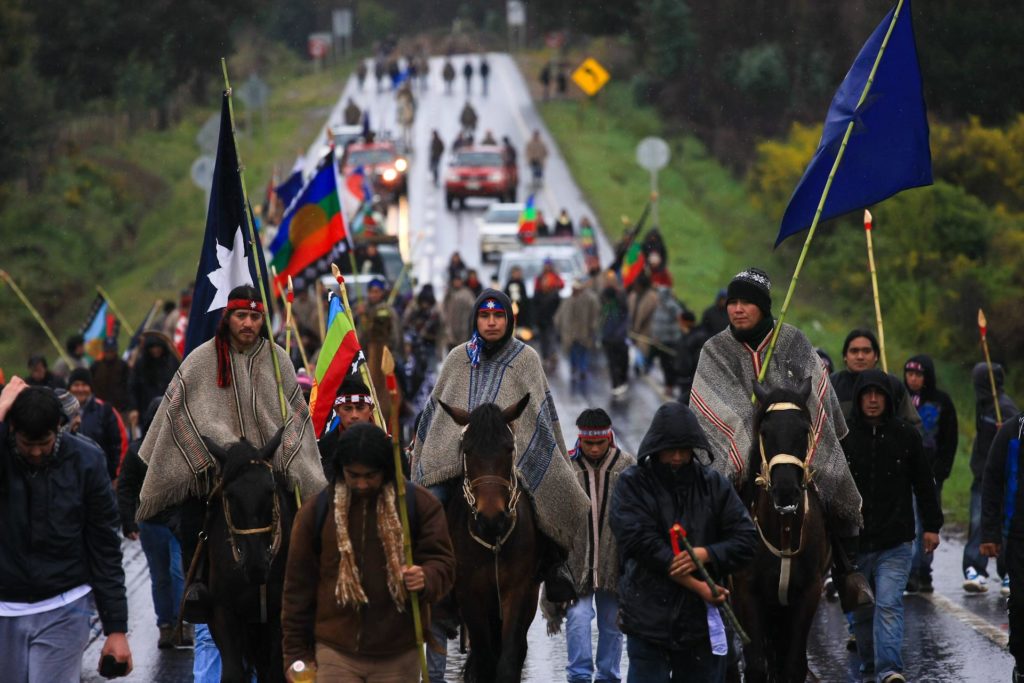
The indigenous communities of southern Chile have seen the dispossession of their lands for private interests for centuries. Their resistance has been met by a systematic criminalization by the Chilean state. Recently, this long struggle entered a new phase in one struggling Mapuche community.
On March 28, Alejandra Araneda and Violeta Araneda went before a judge in the municipality of Concepción for charges related to their 2016 occupation of roughly ten acres of land owned by one of Chile’s most powerful logging companies.
“For years we have suffered from persecution,” said Elvira Sánchez, the spokeswoman for the activists’ land occupation.
Sánchez herself also faces charges for the theft of lumber related to the occupation of land.
The three are part of the recuperation of land in the Curanilahue area of Bío Bio region, which was once home to the Huilliche peoples – which is a branch of the Mapuche peoples of southern Chile – before business interests displaced them.
The activists occupied land owned by the Chilean logging firm Forestal Arauco S.A, which is a subsidiary of the powerful Angelini Group.
Over 60 families formed the community on the occupied land. Member named their new community Construyendo Futuro (Constructing the Future). Since the recuperation began, the community has greatly expanded, with families constructing numerous houses.
Since the occupation began, the community has faced consistent intimidation from the Chilean police and armed forces.
“We are asking nothing else from the government [of right-wing President Sebastián Piñera], we are only asking for the land,” said Sánchez. “There is no place to consturuct housing or terrain to live a dignified life. Because of this we launched the recuperation of the land.”
As the activists went before the judge, other members of the resistance filed an appeal to the charges.
On April 23 of this year, the Chilean police arrived at the occupation to announce another investigation into the number of families living in the growing community. The residents fear that this could lead to their eviction.
For centuries, the indigenous peoples of Chile have struggled for their land. According to Sánchez, the challenges facing indigenous communities were exasperated by the 2010 earthquake.
“We saw things get worse after the earthquake,” said Sánchez. “There is a demand of more than 1,500 families for housing. We have yet to see a solution, so we are taking up our right to housing. We only want the government to be aware of the great necesity that there is for our people and with our recuperation.”
Recovering Stolen Land
Following the 1973 U.S. backed coup against the democractially elected Salvador Allende, the dictatorship of General Augusto Pinochet quickly began to implement the neoliberal reforms promoted by economist Milton Friedman. These policies favored and promoted the private investments and ownership in all aspects of the state, and further colonized the indigneous communities of southern Chile.
“[Since the coup], agro-industry has appropriated a great part of Chile,” Sánchez said.
The Chilean lumber industry was opened up in 1974 by the dictatorship. It was not until 1979 that the massive division of formally communal lands were divided and privatized by the dictatorship as part of Pinochet’s neoliberal policy. Chile’s indigneous communities swiftly lost thousands of acres of their land.
Today, at least 94.5% of the land within the Curanilahue region is owned by the logging firm Forestal Arauco S.A.. Since the early 1990s when the logging operations began, nearly all the native forest in the region has been destroyed for lumber. Nearly eighty percent of the lumber is exported to Canada, the United States, and elsewhere.
The region’s community members argue that the expansion of logging operations has destroyed the bio-diversity of the region.
“The company is destroying everything,” said Sánchez. “Today, there are no flowers or fauna. When we were kids there was [a diverse amount of plant life]. Today there is nothing.”
The charges against the activists is just the most recent case of criminalization of indigenous communities in southern Chile. All too often this criminalization has included the use of anti-terrorism laws against activists.
In 1984, the dictatorship passed the country’s first anti-terrorism law, Ley No. 18,314. The law was in response to a growning insurgency by leftist guerrillas, as well as non-violent actions against the regime. The law remained in place following the return to democracy in the 1990s.
The anti-terrorism law was expanded following the return to democracy to include “arson” as a form of terrorism, and includes the burning of unoccupied buildings, fields, and fences. This charge is most commonly used against Mapuche activists.
A Legacy of Resistance
Southern Chile has been the site of intense resistance to transnational companies and neo-colonialism. Today’s efforts continue centuries of struggle.
Following the war between the Spanish invaders and the Mapuche in the mid-1500s, the Biobío river was marked as the border between the groups. This boundry remained until the late 1800s, when the Chilean State began to colonize the region. The crisis over the land was exasperated following the 1973 coup.
In the modern era, the territory of the Mapuche and Huilliche of southern Chile has become the site of the expansion of private interests, including logging and investments into hyrdro-electric projects. For example, the 3-megawatt Tranquil hydro project on the Tranquil River in sourthern Chile is highly contested by the Mapuche communiteis in the Tres Ríos region. The project is owned by the Austrian based RP-Global, and is financed by the Chilean investment bank Banco Industrial y de Comercio Exterior.
These communities have maintained their right to the land in the face of repression from the Chilean state.
“We have demonstrated before [to demand the right to the land] and we were met by tear-gas,” said Sánchez, “all for our demand for land and a dignified life.”
—
Jeff Abbott is an independent journalist currently based out of Guatemala. His work has appeared at The Progressive, In These Times, and North American Congress on Latin America. Follow him on Twitter @palabrasdeabajo.
